|
Thank you to my friend Emily Turner for posting a status on Facebook about flying that resulted in the long-winded comment that, in turn, resulted in this, an impromptu monologue. I called it Bumped. Bumped by Jeremy Sony I flew first class once. Once. In my life. And it was by total happenstance of getting bumped up to it. Never have I felt so... separated from humanity. They were serving us sodas while the other class cabins were boarding. And by "other class" I mean coach, maybe business, but let's face it, the travel industry is like the poster child for modern day classism. So up in first class, we're having drinks while the rest of the passengers shuffle on. And why is this a bad thing? Well... they could see us, laughing with out FULL CANS of pop, enjoying the elitism that we lorded over them like fat kings over feudal peasants. And God help me, I enjoyed it. Sure, for a minute it felt wrong, like I was a turncoat to my fellow back-of-the-plane compatriots. I was one of them just hours before. And I would be again after this short flight. Then I thought, it's okay if I get my caffeine a few minute before them. It's just a few minutes. They should be happy for me. It's like I won the lottery. I was one of them. Now I'm here. By happenstance, after all. That meant there was hope for everyone in coach. They, too, could get bumped, to sit where I was now seated. Later, my fellow coachers would ask me what it was like "up there". I would bring hope to those trapped behind the curtain. Hope of a new dawn for all airline travelers where seats are roomier, snacks are plentiful, and the drinks flow like nectar from Mt. Olympus. Except, none of that would happen. This was all a lie. The moment we finished our drinks and the plane had boarded behind us, behind that thin curtain that did nothing to hide our debauchery, the flight attendants made an announcement that would bump me back down to reality. There would be no drink service on this flight. It was just for us. The fat kings. The soulless elite. The bumped. The flight attendants had just made us drink our pop in front of the coachers AS THEY BOARDED, and then denied them their sweet refreshment. I knew then that first class was evil. The kind of evil that you bump into, the kind that leaves a mark. I only flew first class that once. And I'm still trying to get back.
Adaptation is a part of life. It's how we evolve and adapt to our existence that ensures survival on an individual and species level. The same goes for writing. Especially when you're writing an adaptation of Washington Irving's The Legend of Sleepy Hollow. On a general level, a playwright's play evolves and adapts throughout its development process. From thought to outline to treatment to draft to workshop to staged reading to performance to publishing to... well, maybe it stops there. Maybe not. For me, I wrote my version of this classic American tale for a wonderful company in Nashville. Street Theatre Company's ClassAct Dramatics wanted a fresh take on the classic for their youth division. So I wrote one. They liked it. They produced it. We called it Ichabod: Missing in Sleepy Hollow. And now, over a year later, I'm renaming it. Rebranding it. The title needed to adapt. To what?
Sleepy Hollow: The Lost Chapter. Nice, huh? I like it. I mean, yeah, of course, that's why I'm renaming the play. But why now? Why the change? Mostly, the original title didn't actually fit the play anymore. Titles are hard. Playwrights spend hours agonizing over them (some of us do). You want something that resonates with the play, something that looks good on a poster, something that draws in an audience and sets them up for what they're about to see. You want it to sound cool. I know that sounds simplistic, but it's true. There are tons of play titles, just like there are tons of book titles and movie titles and TV show titles --- all in, millions of fragmented sentences and words trying to catch someone's eye. To break out and get an audience member to pause, to click, to read. I mean look at the title of my blog post. It's click-bait 101. No, seriously, I went to a site and put in some words and it generated that. Except in this case, I'll defend using it, because not only does my play basically ask you to forget everything you learned about Sleepy Hollow; I had to forget a lot of what I thought about my own play going in to find the right title after it was all said and done. You see, my play opens after Ichabod vanishes (in those final climatic pages of the original story). But it's not a sequel. Per se (which, I think, the original title indicated... you see why I was having trouble with it). In those few pages of Irving's text, after Ichabod disappears, but before everything settles down and (SPOILER ALERT) Brom and Katrina get married, I wrote a play. That's where it lives. There, and in the epilogue. It pulls from key moments of the original text (primarily the bit about the headless horseman, because, I mean, that's why people come see shows about Sleepy Hollow), but most of the script is my own invention of events of what really happened. The idea I had was that Ichabod's former students and their new teacher would solve the mystery of his disappearance. Hence, Ichabod was Missing. In Sleepy Hollow. Relying on the most recognized character in the story (since, it's his story), I thought I'd go with the name and play on it. For some reason, I didn't think about changing it after that. It happened. It was a thing. I didn't want to negate that and I had a production to build on. A name change, I thought, would be a step back. As the play was finished and performed, and then subsequently read at Curtain Players theatre in central Ohio, and workshopped into a further polished play, it became clear that while Ichabod being missing was the event of the play (along with the upcoming nuptials of the future Mr. & Mrs. Brom Van Brunt), it wasn't the whole story. He wasn't even the main character of the play. And there's a reason for that. Have you read the original story lately? (You can do that here at Project Gutenberg.) Going outside the part we all remember, with Ichabod being chased down by a headless horseman, the bulk of the story is full of detailed descriptions of small village life in rural 1790 America (which, if you remember, is just seven years after the end of the Revolutionary War... this story takes place when George Washington is President, and New York is the capital of the U.S.). The story focuses very little on anything that happens outside Sleepy Hollow. It's more about Ichabod Crane settling into this tiny village in upstate New York (upstate circa 1790, which puts it about 53 minutes by car from Brooklyn today); and the guy is kind of a louse. I'm sorry, but he is. He's mean. He's only after Katrina for her father's money. And he's kind of a snob to Brom Bones (his perceived rival for Katrina's affections). In Ichabod's defense, I suppose you could argue that he is written as a man of the times, though that thought is actually more disturbing. When I set out to adapt it, I knew I wasn't making him my lead; but I still named the piece after him (or, again, after the perceived crux of the play). Which was strange, because the new school teacher, Abigail Seymour, and the oldest student, Hanna, were clearly my dual protagonists. Hanna going so far as to take on the closest thing to narration duties anyone could have in this script. After a year or tweaking it, I realized that the original title felt wrong. It felt like it wasn't genuine to the play. Or to Abigail and Hanna. This had really become a Lost Chapter of a larger piece; a play that pulls from the story of Ichabod, Katrina, and Brom, and of the residents' tales of ghosts that haunt their village, but that tells its own story. It's like the end of Back to the Future II, where Marty McFly is running around in 1955 again while the original plot of the first film is going on and you're watching all this stuff happen that you didn't know was happening, but now that you know, it's pretty sweet. Yeah, it's like that. It fits into the original; you could practically cut and paste it on that one page near the very end; but it also makes you look at the story from another perspective (and if you haven't seen the Back to the Future Trilogy, please do; both to get my point and because it's Back to the Future). I wasn't changing Washington Irving's world --- just shining a new light on it. Okay, I did change things a bit. Again, adaptation. So why the new title now? There are lots of adaptations of Sleepy Hollow out there, in and out of the theatre world. Lots of versions done by theaters all over, every year, and I wanted a title that stood out, but that made it clear this was different than a faithful adaptation. I want it produced elsewhere. I want to see it happening around the country, for it to become a Fall tradition. And I didn't think the old title was inviting that to happen. I just didn't. And I knew the play. One of my playwriting professors once said he didn't think there were many plays that could pull off a gerund in the title. I think he was right about this one. More so, when you read the old title and the synopsis, they didn't gel. If you read the first act sample, they didn't click. Because that's not what the play's about. It's not about Ichabod being missing. Ichabod just happens to be missing. It's much more the journey of Hanna and Abigail, their friendship, and the mystery as to why the horseman haunts Sleepy Hollow. It's Sleepy Hollow, but with more of the world being revealed. It's meant to complement the original, remind you of it, take you back to it, but it's its own story. Did I take liberties? Yeah. Is Abigail maybe more independent than young women of 1790 upstate New York were portrayed? I sure hope so. Truly, in essence, it's fan fic. Let's be honest, cards on the table; all adaptations are fan fic. The FOX TV show Sleepy Hollow (which I love), or Once Upon a Time on ABC, or the book (and musical) Wicked, or BBC's Sherlock, CBS's Elementary, or the film Maleficent, or hey, even Frozen, or pretty much every Disney film ever made... it's all fan fic. They're all adaptations of other stories. You know the movie Tangled was once called something else. Probably Rapunzel. But they changed it. Now, some say that Disney did that to market the film to boys as well as girls (apparently boys can't handle watching a film named after a women or some such rubbish), but gender politics aside, I think Tangled is a better title. That story is, yes, about Rapunzel, but it's also very much about her and Flynn Rider and this adventure that they (yeah, I'm going there) get tangled up in together. It's a cute title that ultimately fits that movie better. In the case of my own freely adapted piece, I think it makes sense for the title to adapt along with it. The new title, SLEEPY HOLLOW: THE LOST CHAPTER, conveys more of what it actually is, what I consider it... a lost chapter. My play stays true to the title of the original Washington Irving story, while hopefully indicating that there's going to be something new coming to the table. To me, it gels. As the description states: When Ichabod Crane went missing in Sleepy Hollow on that fateful night in 1790, it was thought that to be the end of the story; but Ichabod Crane wasn't the only schoolteacher to come to Sleepy Hollow. SLEEPY HOLLOW: THE LOST CHAPTER picks up in the final pages of Washington Irving's classic, revealing a previously untold piece of the legend. After Ichabod disappears, his students are determined to find out the truth of what happened. Their new schoolteacher, Abigail Seymour, is more focused on teaching than chasing ghosts---that is until she has her own run-in with the Horseman. Now, she and the students must hurry to retrace Ichabod's final night in Sleepy Hollow and find a way to stop the Horseman once and for all; along the way, we discover new revelations, gain clues on who the Headless Horseman could be, and meet all the original Irving characters from The Legend of Sleepy Hollow. Adaptation is fun. As a playwright, it's not something I saw myself doing regularly, but now it's a huge part of my writing world. First Sleepy Hollow: The Lost Chapter, then I did my own take on The Legend of Robin Hood, and up next I'm working on The Last Queen of Wonderland (you can figure out where that one's coming from). But then, really, most writing is adaptation. Even original stories (if there are any left), get written and rewritten. Writers go through that process I mentioned earlier with workshops and readings, and eventually a writer is adapting her own words. She's taken an idea, a scene, and outline, and adapted it in the revision process. Evolved it. Made it into something new. Until it's just right. Thinking of it that way, it makes sense to me that sometimes our titles have to adapt during that process. I'm probably not alone on that at all. For me, it was immensely helpful. Once the title changed, the revision fell into place. It helped me to mentally forget everything I knew about the Sleepy Hollow I was writing, and focus on the one I was supposed to be writing. Adaptation is a part of life. It's something I'll think about more with my future writing, especially if I'm stuck. Might not be just the play that needs to adapt. Might be the title. Kicking off 2015 with some excitement! My home away from home, Nashville, beckons once again as I'm writing my third play for ClassAct Dramatics at Street Theatre Company! First, we went to Sleepy Hollow in 2013. Last year, it was off to Sherwood Forest. And now, I'm taking them to one of my favorite places of all... Wonderland!
In a few short hours, I'll begin my trek to one of my artistic havens: Nashville. The Music City has been more than gracious to me on the playwriting front. This weekend, the talented folks at Street Theatre Company will open my latest full-length play, The Legend of Robin Hood. Yep, that Robin Hood. Sword fights. Archery. Ballads. Kings. Queens. Family. Love. Betrayal. Heroes. Outlaws. It's my take on the legend, so you know there's going to be some twists and surprises. It's, hands-down, the most epic thing I've ever written. And two years ago, I never could have predicted myself writing it.
Since finishing grad school, the plays I've written have surprised me, inspired me, but are nothing that I expected to be writing. If you've only come to know me recently, then you'd probably know me by my literary and historical reimaginings (yeah, I made that word up, but it aptly describes what I've been writing). Whether it was Ichabod: Missing in Sleepy Hollow or my Grove City History Play, or my new take on the merriest outlaw in Sherwood, my plays of late have focused on bringing audiences an old favorite story and showing it to them in a new light. But what's the real surprise of all this? How about who I've been writing for? What I've been writing? But probably not for the reasons you think. When I was in school, I was always trying to write heavy family dramas, plays that I thought would stand up against Death of a Salesman or Who's Afraid of Virginia Woolf. (No, I wasn't aiming big or anything.) I wrote about the collapse of journalistic ethics, the destruction of mom & pop businesses, and the state of hydraulic fracking in the Heartland. And I love those plays, but in looking back, I think I might have let the auspices of grad school fill me with some notion that I had to write about world-changing issues; I had to make a statement; I had to write importantly. Yeah, importantly. Then, last year, as grad school finished up, I heard about a contest in Nashville. A theatre was looking for a new version of the classic The Legend of Sleepy Hollow. For their youth program. To be performed by kids. Fun fact: the first play I was ever in, ever, my first true theatrical venture (not counting the middle school "musical" I was forced into by my choir teacher) was a play by adults for children called I Didn't Know That. It was fun. It was informative. It was exhausting (it was a bunch of grown-up playing a zillion characters to teach youth audiences the little known facts about the stuff in our world). So now, more than a decade after that, and after three years of trying to write importantly, I had the chance to write this play, my version of Ichabod and Sleepy Hollow, and I told myself to relax. To have fun. To write a play that I'd watch now and that I'd watch when I was 12 and that I'd want to perform at any age. To write a play that was just... engaging. Important. Engaging. These are buzz words we use. The bottom line is, Ichabod was the first play I'd written in a long time that I could watch over and over. Again, I love my grad school plays; but anyone who saw them knows they're not the kind of play you watch over and over. You watch them. You take them in. You talk about them. You move on. But that seems weird to me because I love watching my favorite movies over and over ---- shouldn't I want to watch my plays over and over? And over? Yeah. I should. As I came to that realization, I came to another. When I started writing plays like Ichabod and Robin Hood, I didn't know how to classify them. Children's theatre? Theatre for youth audiences? Yeah, and then no, on both. Yes, these plays have been developed to be performed by a youth acting troupe. They're also written to be performed by adults. And who's the audience? Kids? Yes. Adult? Yes. I call them "Theatre for ALL audiences" --- because I'm a firm believer that these plays should be enjoyed by families. They should be plays that kids enjoy, but that the adults in the audience enjoy as well. And I say that for two reasons. One, young people should experience the theatre. That is, by far, the most rewarding aspect of working with Street Theatre Company ClassAct Dramatics --- knowing that, right now, tonight, almost three dozen youth actors, ages 8-17, are performing a play together. I wasn't in a play until I was in college. I didn't know the theatre very much until I was almost 20. And some people don't come to know it until much later, if at all. My friend Eric Coble, a wonderful playwright, recently mentioned in a Facebook post (and I'm sorry, Eric, I'm gonna butcher this in paraphrasing), there is sometimes an attitude towards "children's theatre" --- that it's not as "important" as the kind of theatre that wins Pulitzers or Tonys. It's not Death of a Salesman. But really, isn't it more important? Plays for kids to perform or see should inspire them. We should put everything into them to make them engaging, real, and the best example of our craft. If theatre isn't accessible from the start, why would kids grow up to enjoy it later? They have TV, movies, ipods, Xbox, Netflix, Hulu, and so many things that bring them digital and virtual experiences, entertainment piped right to their hands; it's easy to see why people would forgo a theatrical experience. Especially when playwrights come out of grad school trying to write importantly. As my mom likes to remind me, she goes to the theatre to relax. To escape. To get lost in a story. And that brings up my second reason: plays need to be engaging to kids for the reasons I said, but they also should be engaging to adults. And not just the theatre crowd. Not just the art crowd. All audiences. There is no reason that a stageplay cannot be as amazing and moving and fully engaging on a fun, thought-provoking, heart-pounding, tears-inducing level as any blockbuster film or event television. And it should be more so, because it's all happening live, in front of an audience, with nothing but a few feet of air and imagination separating them. For too long, I thought my plays had to be statements. They had to be worthy of critical praise or refined enough to be taught as high-art and literature. I kinda forgot that plays are designed, first and foremost, for one group: an audience. For people who spend their hard-earned money for a night out. They come into a dark room, asking for a story. Not to say there isn't a place for statements and art. There is. In the story. The best theatre teaches us while it entertains us. It's like a magician. Slight of hand. We're learning about the world and ourselves, like art teaches us, but we're so engaged in the story, in the play, in the characters, that in the moment, that we don't notice. I think for too long, I didn't put that together. No matter what I'm trying to say as an artist, if people don't want to see the play over and over, they probably won't hear the message. It won't stick with them. So lately, I haven't been writing many super-issue plays as I used to think of them --- I've been writing stories. About people. There might be issues. But they're stories about people. To get lost in. And while I'm sure my grad school self would be confused, I'm loving it. I'm excited. Like I said, Nashville has been good to me. The people are wonderful. The talent is amazing. They have embraced my writing and I've learned quite a bit about craft and editing and structure. The biggest lesson, so far, has been letting go of all the preconceived notions of what "importantly" means. At the end of the day, a show is only as good as the audience remembers it. Do they talk about it? Does it sit with them? Do they come back to see it again? Do they bring friends? That's always the best compliment. Writing Robin Hood and Ichabod, and working on my next project for the City of Grove City about their own stories, has been invigorating and reminded me what I love about theatre; what drew me in; why I get on stage; why I sit in an audience. To hear a story. To see a show. To experience the magic. Nashville, and by that I mean all the theaters there that I've worked with---from STC to Nashville Rep to Playhouse Nashville---has taught me so much about embracing the audience and giving them a good show. I hope they like this one. Break legs to the cast and crew! Can't wait to see it. Street Theatre Company ClassAct Dramatics presents The Legend of Robin Hood by Jeremy Sony November 14-22, 2014 www.streettheatrecompany.org Over the weekend, two pretty amazing things happened. We had a baby shower for the future Baby Sony. And I did a 24 hour theatre show. It was probably an insane thing to do, writing a play the same weekend that we had a baby shower, but sometimes insanity breeds creativity. It was a fantastic experience, produced by the wonderful folks at Available Light Theatre. You can see from their tweet below that we had a fantastic house for this one-night only event. Every 24 hour theatre event is different in execution, but the base plan is the same: gather a bunch of playwrights, directors, actors, and designer, and then give them 24 hours to write and stage a bunch of short plays. Yep. One day. An actual 24 hours. We gathered on Friday night, where the playwrights found out how many actors we'd get, our directors, and some inspiration in the form of costumes and props. Then we (the playwrights) went off and wrote all night (writing time officially commenced at 8pm on Friday). On Saturday morning (about 7am), scripts were done and emailed to AVLT, given to the directors and actors (who arrived at 8am), and they worked through the day to stage each show. We're talking some light and sound design, blocking, memorizing lines... like a fully rehearsed play, only they did it in about 12 hours. These plays were each about 15 minutes, give or take. I didn't time mine, as I was too busy enjoying everything AVLT and my team put into it. The entire night was a good ride. Lots of variations in terms of play styles, comedies, dramas, etc. There was even a musical! A musical, people. Yeah. Overall, I think AVLT should be extremely proud of the event. They brought together a grand assortment of theatre artists from around Columbus, Ohio, so it was a thrill to see how everyone came together --- many who had never worked together before --- to create a full evening of brand new plays. Since a one-night only theatre event (that looks from the AVLT tweet above to maybe have sold out) means not everyone could be there to see the results of our insanity, I wanted to share my script. Or hey, maybe you saw it and you're interested to see what the show looked like on the page when the actors and director picked up and set to work. Either way, here is what I wrote this weekend, which AVLT staged beautifully. Special thanks to my director, Brant Jones, and my amazing actors Beth Josephsen, John Connor, Audrey Rush, and Chris Austin.
2008 would become the year we'd film an investment trailer for Cole's company, Glass City Films. GCF was co-founded by OSU grad Cole and a man named John Klein, and it so happened he, like me, also went to Notre Dame for film (just coming in the year after I left). Cole reprised his role as Bailey Palmer in the investment trailer. I got a crash course in directing for film (ya know, that wasn't a school project --- big honking difference), and an 8-minute extended trailer (for a movie that didn't exist yet) was born. In the end, that investment trailer helped GCF secure a budget and in the Fall of 2009, we began filming the feature. Only now, I was focused on being the screenwriter and Cole stepped in the direct. That film would take less than month to shoot, both in Columbus and in Toledo. It was a whirlwind. I was going back and forth from the film set to helping my own theatre company open a show. And they were shooting in my house, so it was kind of crazy. But just as quick as it started, filming wrapped. That was five years ago. A year later, in the Fall of 2010, we began screening the film in Columbus, Toledo, and Chicago (where GCF is primarily based now). It was pretty sweet. "Separation Anxiety" went on to hit some festivals, getting nominated and winning some awards like Best Drama at the Riverbend Film Fest and Best Director at Trail Dance (where it was also nominated for Best Drama and Best Actress for Kiana Harris). Laila and I got to travel to Alexandria, VA, in the Fall of 2011, with Cole for a film fest screening and it was such a blast. I was both excited and humbled to have my film included in the line up at each of these festivals. This movie was made on a tiny budget (film-wise), somewhere around $50,000 (you'd have to ask GCF, I'm not a numbers guy, I'm a words guy). The leads were OSU grads (and a student I think), Tyler Seiple, Kiana Harris, and Corbin Jones. And we had two film vets in our key supporting roles: Polly Adams (United 93) as Lily, and one of the best TV dads ever, John Wesley Shipp as Mr. Palmer (seriously, JWP is a gem to work with; and he was Dawson's dad on Dawson's Creek and he's Barry Allen's dad on The Flash on CW!). I still remember John Klein asking me who I'd cast as Mr. Palmer if I could just cast anyone, and I said (I thought wistfully) "John Wesley Shipp, of course." And then John Klein got him for the film. Awesome. For so many years, there were only a handful of friends and family who ever got to see this movie, and so I'm beyond thrilled that it's now available for everyone to watch. Being a little indie-drama, I know it's not going to break box office records, Avenger's style, but that's cool. I'm just glad that people have a chance to see it now and I hope they like it. I hope they rent it. I hope they buy it. I hope they find something in the film that speaks to them and I hope they share it with their friends.
Here are some photos from some of the premieres from 2010. I'll leave you with these to close out and encourage you to visit my Separation Anxiety film page where you can watch the trailer and some behind-the-scenes action and see if its your kind of movie. Even if it's not, I bet you know someone who would like it, so please do me a favor and tell people about the film and send them my way (or to Amazon or Google or their XBOX, etc.). Happy viewing! (But seriously, bring tissues... it's a dramedy... with the drama). 20 years ago, in 9th grade, my English teacher had us write an essay on our dreams for what we wanted to do in the future when we grew up. I wrote about my dream to be one of the first private citizens to fly in space, that I would live to see a world in which private citizens would have that opportunity. He gave me a C, and wrote on my essay that if I wanted to go into space, that I should "dream of being an astronaut." Because that's what I meant. Obviously. Well, Mr. Kull, being an astronaut would have been awesome and is a wonderful dream and goal... just not for me. Telling people what they should dream about defeats the purpose of dreams. My dream was, and still is, frankly, rooted in something larger; a wish for humanity to advance to the point where regular people could go into space. I don't want to go up and fix a telescope. I just want to look out the window. I know the path to that dream is a lot of small moves and the persistence of talented people. Luckily, it turns out, I'm not the only one who has this dream. And I'm thrilled, and not at all surprised, by that. Going to look into this more, do some homework, and figure out the veracity of it all... but if there's a chance of getting to space in my lifetime, I have to hope that something like this actually works. Small moves. Plus, it would be cool to be the first playwright in space. Just, ya know... because, right?!
Earlier this year, the City of Grove City, Ohio, commissioned me to write a new play for 2015 to commemorate the 200th Anniversary of Jackson Township and the role that Grove City has played in its history and development. While the full play will premiere next Spring, the city is working with their hometown theater, the Little Theatre Off Broadway (LTOB), to present a first look preview of the play at this weekend's Arts in the Alley festival.
It's been a great pleasure working on this play thus far; and although I can't share the full story with you until next Spring, I'm thrilled that Grove City and LTOB are bringing this first look to the stage. And all during an arts fest celebrating its 35th year. They're calling for an absolutely beautiful weekend in Grove City, like high 70s/low 80s, so please come and enjoy the arts festival and stop by LTOB for one of our six performances of the first look of the Grove City Play. See you in the theater!
I do not understand the push for younger audiences on TV. No one likes when one of their favorite shows gets canceled, but this one just upsets me. Longmire averaged 5.6 million viewers an episode this season. It was A&E's 2nd highest rated show (best scripted show) and rated higher than other cable champions like Mad Men. Even Breaking Bad barely cracked the 2 million view mark for the first four seasons, before skyrocketing to 5 and 6 million viewer averages in the final year. So 5.6 millions seems great. Why isn't it? A&E had some thoughts on that. So do I.
According to an article from the Wall Street Journal (also linked to the picture, above right): "A&E's Mr. Silberman said the decision was specific to 'Longmire.' 'We gave it three seasons,' he said, adding, 'we genuinely loved the show but the audiences in the key demographics just weren't there.'" Those key demos? 18-24 & 25-54. Longmire's audience had a median age of 60 (really?)...okay, so why not sell ads for the demos you had? None of those 5.6 million people have money to buy things? And SOME of them have to be in the 25-54 demo (half of them are under 60, by the definition of median). Okay, so no one over the age of 54 is worth anything to advertisers (really?). So maybe A&E could actually support and advertise the show to the demos it wanted. I'm pretty sure that I know lots of people in the 25-54 demo who would happily watch Katee Sackhoff, Bailey Chase, Lou Diamond Phillips, and Robert Taylor read them the phone book. As Longmire's EP Greer Shephard said, "It is hard for me to believe that you are not able to monetize one of your highest-rated shows." Aside from the disappointment of seeing Longmire axed (though, I am hopeful that the producers can land the show elsewhere for a season 4), I am disappointed that in 20 years, what I watch won't matter to advertisers or networks. That I only have 20 good years of being a "key demo" when it comes to the ratings system that drives TV; a ratings system that is horribly outdated and is probably doing more to destroy traditional television that any viewing habits out there or new technologies. As someone who would love to work in TV, I guess I'm going to have to learn to understand it. And hope something changes. On Facebook and want to follow the LongLiveLongmire campaign there? Visit their page here. |
Jeremy's blog
Thoughts. From my brain. Anything to do with how we tell stories and the stories we tell each other. Literally and figuratively. About JeremyWriter. Husband. Father. Effulgent dreamer. A Fightin' Irishman (@NDdotEDU '01). A playwriting Bobcat (MFA in Playwriting, @OhioU '13). I write plays. I'm a geek. I wanted to be an astronaut. I go places in my head.
Categories
All
Archives
January 2022
|
|||||||||||||||||||||||||||

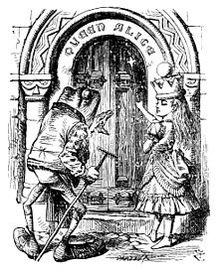
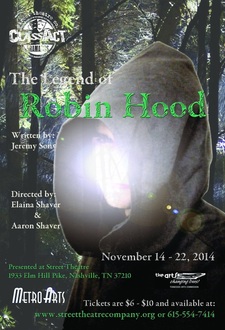
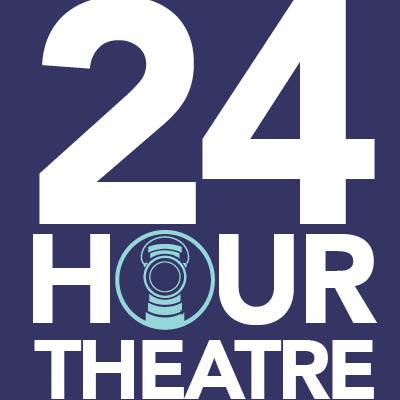
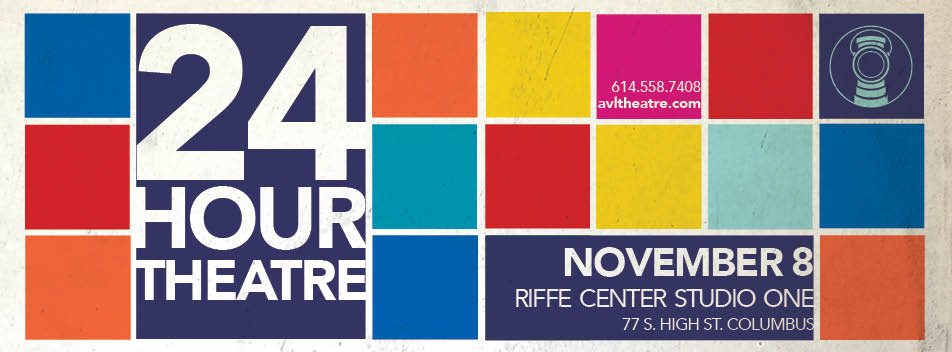
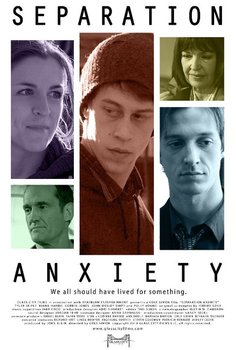




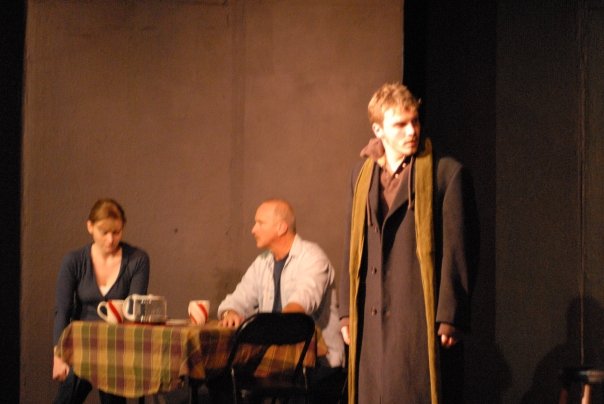
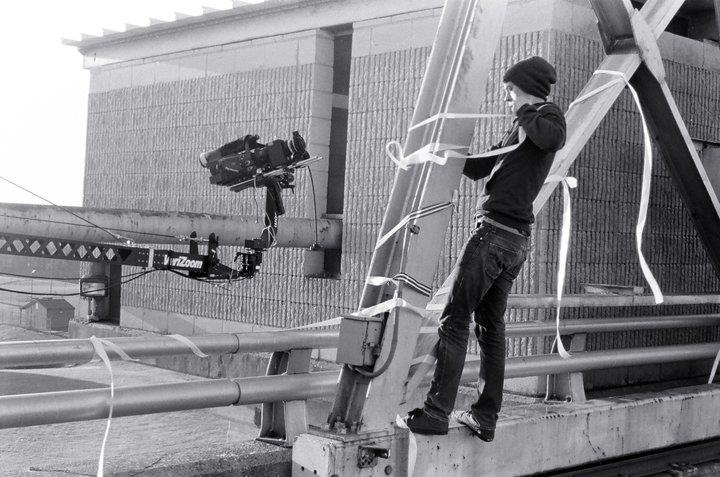
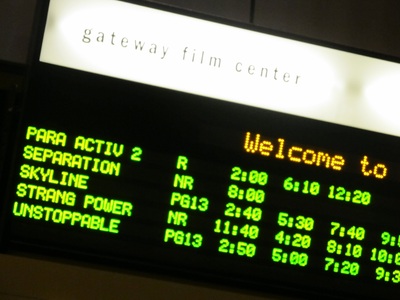
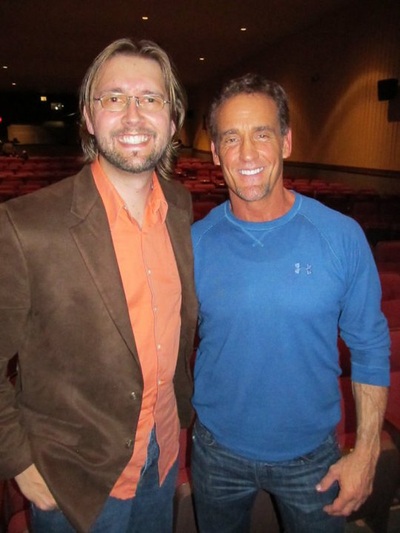
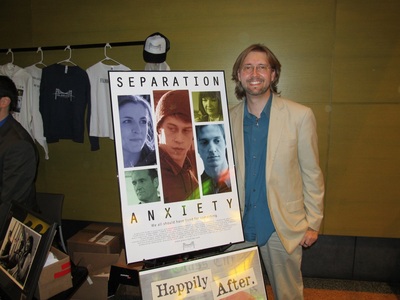
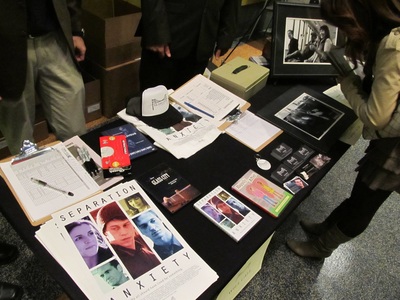
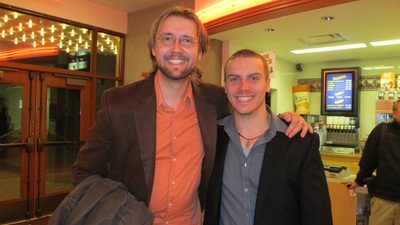
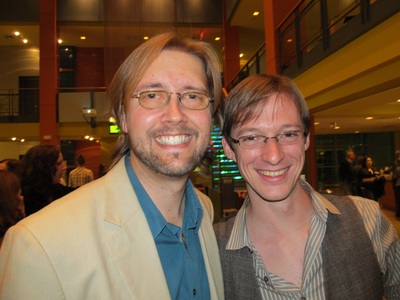

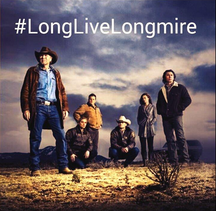
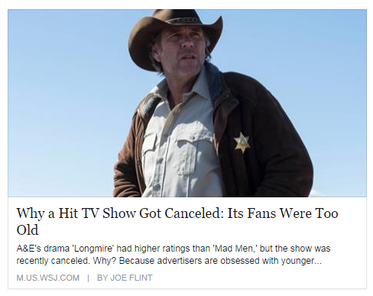
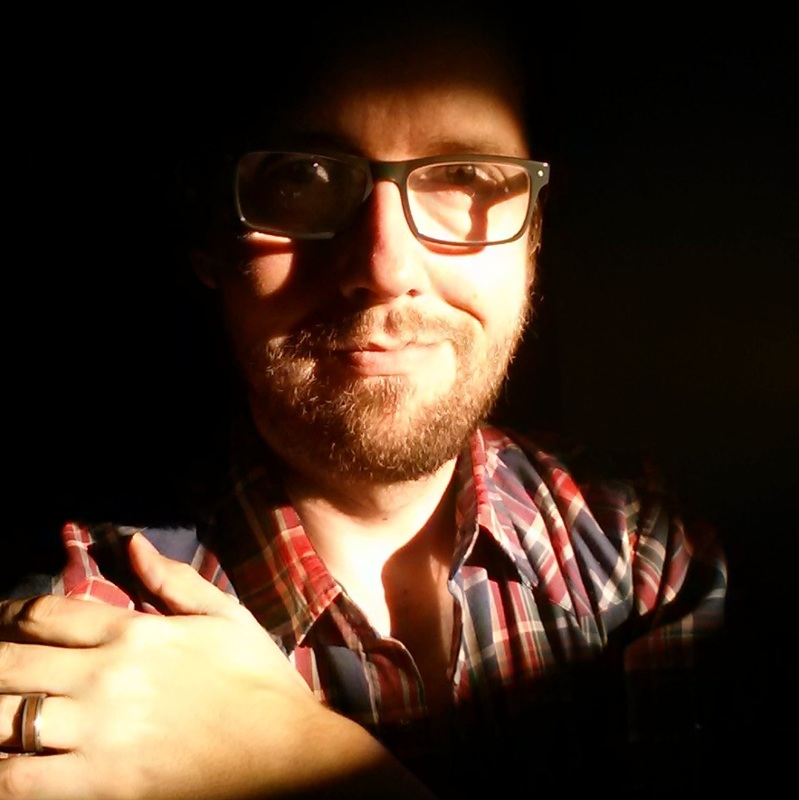
 RSS Feed
RSS Feed